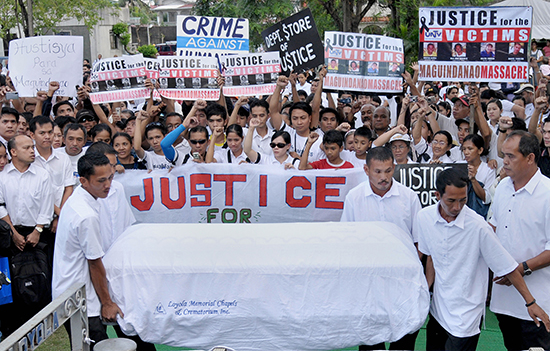Recommendations
In recognition that unpunished violence against journalists represents one of the greatest threats to the free flow of information, CPJ makes the following recommendations:

To national governments and political leaders:
- Condemn publicly and unequivocally all acts of violence against journalists.
- Publicly recognize the International Day to End Impunity for Crimes Against Journalists on November 2.
- Provide sufficient resources and political support to ensure that authorities conduct exhaustive and timely investigations and trials relating to crimes against journalists.
- Request progress reports on all unresolved journalist killings from investigative agencies and judicial offices. Reopen closed investigations and invigorate those that have stalled.
- See that investigations extend to the crime’s masterminds in addition to immediate killers.
- As circumstances warrant, transfer cases from locations where suspects may influence proceedings to new jurisdictions. Assign special prosecutors and/or increase witness protection.
- Identify and penalize all actors who impede justice through professional misconduct, corruption, threats, or violence.
- Address necessary legislation, resourcing, and staffing, for example by:
- Reforming laws to give national authorities broader jurisdiction to investigate and prosecute crimes where provincial authorities have failed.
- Creating an independent panel, including media personnel, investigators, prosecutors, legal experts, and government representatives, to review unsolved cases, scrutinize investigations, and make recommendations. The makeup and conclusions of the panel should be transparent.
- Introducing or strengthening programs and legislation to promote speedy and effective investigations and trials, such as forensic training, judicial reform, and witness protection programs.
- Respond with detailed information on the judicial status of all cases of killed journalists and steps taken to address impunity as requested by UNESCO’s director-general for the bi-annual report on the Safety of Journalists and the Danger of Impunity. Make the full responses available to the public.
- Implement recommendations to address impunity made through the Universal Periodic Review mechanism and through U.N. special procedures.
- Implement commitments made through the UNGA resolution on the safety of journalists, U.N. Human Rights Council resolution on the safety of journalists, and U.N. Security Council resolution 1738. Facilitate thorough implementation of the U.N. Plan of Action for the Safety of Journalists and the Issue of Impunity.
To U.N. agencies:
- Take concrete steps to hold member states accountable for commitments made in the UNGA resolution on the safety of journalists.
- Address gaps in coordination and participation in the U.N. Plan of Action for the Safety of Journalists and the Issue of Impunity. Clearly identify the roles and contributions of agencies, including UNDP, UNODC, UN Women, OCHA, DPKO, and others. This coordination must be reflected in field offices.
- Fully integrate measures of progress over impunity in media killings and safety of journalists into development goals and the Department of Peacekeeping Operations mandate renewal evaluation.
To the office of the secretary-general:
- Take into account data on journalist attacks and the effectiveness of government remedies to impunity in your report to the General Assembly requested in Resolution 68/163 on the safety of journalists and impunity.
To members of regional inter-governmental bodies:
- Participate and comply with the procedures, guidelines, and rulings of regional courts and communications from regional groupings.
- Take concrete actions in both regional and bilateral fora to hold to account states that fail to comply with decisions by regional courts and other special procedures.
To local and international journalists:
- Monitor and report on implementation of key international commitments to combat impunity, particularly the U.N. Plan of Action for the Safety of Journalists and the Issue of Impunity and the UNGA resolution on the safety of journalists.
- Investigate and report on issues of anti-press violence, including individual attacks, threats, and harassment, regardless of the victim’s media affiliation.